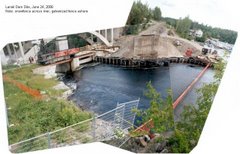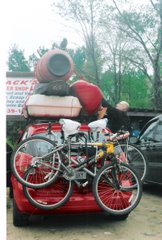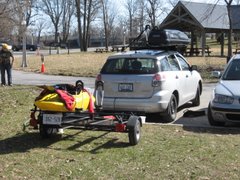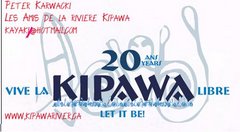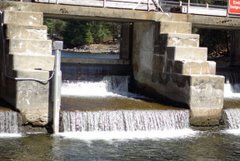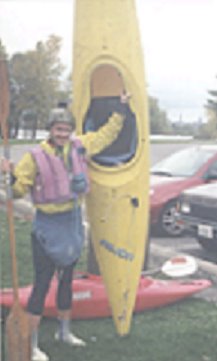Celente is predicting a great depression for North America: Guess what effect this will have on river preservation and environmentalism: they will be push to the side as concerns about basic survival take hold: food, clothing and shelter, we won't be struggling to save the polar bears or free flowing whitewater... Read on.
10 Trends for 2011
by Gerald Celente
Previously by Gerald Celente: 'Off With Their Heads 2.0'
After the tumultuous years of the Great Recession, a battered people may wish that 2011 will bring a return to kinder, gentler times. But that is not what we are predicting. Instead, the fruits of government and institutional action – and inaction – on many fronts will ripen in unplanned-for fashions.
Trends we have previously identified, and that have been brewing for some time, will reach maturity in 2011, impacting just about everyone in the world.
1. Wake-Up Call In 2011, the people of all nations will fully recognize how grave economic conditions have become, how ineffectual and self-serving the so-called solutions have been, and how dire the consequences will be. Having become convinced of the inability of leaders and know-it-all "arbiters of everything" to fulfill their promises, the people will do more than just question authority, they will defy authority. The seeds of revolution will be sown….
2. Crack-Up 2011 Among our Top Trends for last year was the "Crash of 2010." What happened? The stock market didn’t crash. We know. We made it clear in our Autumn Trends Journal that we were not forecasting a stock market crash – the equity markets were no longer a legitimate indicator of recovery or the real state of the economy. Yet the reliable indicators (employment numbers, the real estate market, currency pressures, sovereign debt problems) all bordered between crisis and disaster. In 2011, with the arsenal of schemes to prop them up depleted, we predict "Crack-Up 2011": teetering economies will collapse, currency wars will ensue, trade barriers will be erected, economic unions will splinter, and the onset of the "Greatest Depression" will be recognized by everyone….
3. Screw the People As times get even tougher and people get even poorer, the "authorities" will intensify their efforts to extract the funds needed to meet fiscal obligations. While there will be variations on the theme, the governments’ song will be the same: cut what you give, raise what you take.
4. Crime Waves No job + no money + compounding debt = high stress, strained relations, short fuses. In 2011, with the fuse lit, it will be prime time for Crime Time. When people lose everything and they have nothing left to lose, they lose it. Hardship-driven crimes will be committed across the socioeconomic spectrum by legions of the on-the-edge desperate who will do whatever they must to keep a roof over their heads and put food on the table….
5. Crackdown on Liberty As crime rates rise, so will the voices demanding a crackdown. A national crusade to "Get Tough on Crime" will be waged against the citizenry. And just as in the "War on Terror," where "suspected terrorists" are killed before proven guilty or jailed without trial, in the "War on Crime" everyone is a suspect until proven innocent….
6. Alternative Energy In laboratories and workshops unnoticed by mainstream analysts, scientific visionaries and entrepreneurs are forging a new physics incorporating principles once thought impossible, working to create devices that liberate more energy than they consume. What are they, and how long will it be before they can be brought to market? Shrewd investors will ignore the "can’t be done" skepticism, and examine the newly emerging energy trend opportunities that will come of age in 2011….
7. Journalism 2.0 Though the trend has been in the making since the dawn of the Internet Revolution, 2011 will mark the year that new methods of news and information distribution will render the 20th century model obsolete. With its unparalleled reach across borders and language barriers, "Journalism 2.0" has the potential to influence and educate citizens in a way that governments and corporate media moguls would never permit. Of the hundreds of trends we have forecast over three decades, few have the possibility of such far-reaching effects….
8. Cyberwars Just a decade ago, when the digital age was blooming and hackers were looked upon as annoying geeks, we forecast that the intrinsic fragility of the Internet and the vulnerability of the data it carried made it ripe for cyber-crime and cyber-warfare to flourish. In 2010, every major government acknowledged that Cyberwar was a clear and present danger and, in fact, had already begun. The demonstrable effects of Cyberwar and its companion, Cybercrime, are already significant – and will come of age in 2011. Equally disruptive will be the harsh measures taken by global governments to control free access to the web, identify its users, and literally shut down computers that it considers a threat to national security….
9. Youth of the World Unite University degrees in hand yet out of work, in debt and with no prospects on the horizon, feeling betrayed and angry, forced to live back at home, young adults and 20-somethings are mad as hell, and they’re not going to take it anymore. Filled with vigor, rife with passion, but not mature enough to control their impulses, the confrontations they engage in will often escalate disproportionately. Government efforts to exert control and return the youth to quiet complacency will be ham-fisted and ineffectual. The Revolution will be televised … blogged, YouTubed, Twittered and….
10. End of The World! The closer we get to 2012, the louder the calls will be that the "End is Near!" There have always been sects, at any time in history, that saw signs and portents proving the end of the world was imminent. But 2012 seems to hold a special meaning across a wide segment of "End-time" believers. Among the Armageddonites, the actual end of the world and annihilation of the Earth in 2012 is a matter of certainty. Even the rational and informed that carefully follow the news of never-ending global crises, may sometimes feel the world is in a perilous state. Both streams of thought are leading many to reevaluate their chances for personal survival, be it in heaven or on earth….
December 18, 2010
Gerald Celente is founder and director of The Trends Research Institute, author of Trends 2000 and Trend Tracking (Warner Books), and publisher of The Trends Journal. He has been forecasting trends since 1980, and recently called “The Collapse of ’09.”
Copyright © 2010 Gerald Celente
The Best of Gerald Celente
Tuesday, December 21, 2010
Subscribe to:
Comments (Atom)
Useful Links
- Mount Gox - Bitcoin exchange
- Reggie Middleton's Rapier Analysis
- Ontario Rivers Alliance
- Geodesic Dome Construction
- Canadian Disaster Preparedness
- Globe and Mail
- Chris' The Weekly Telegram
- Michael Rupert of CollapseNet
- Max Keiser
- Nicole Foss Blog - the automatic earth
- Peak Moment Discussions
- Scotia Mocatta Bullion Store
- Dimitry Orlov - Peak Moment Discussions
- Jims's ISFCR Blog
- Jenny Right Side Blog
- Scott Sorensen
Alternative Energy Sites I like
The Queen is not amused!

http://www.ispeakforcanadianrivers.ca/
The Ashlu river: it could happen to you

Whitewater Ontario

Working Hard to Protect Canada's Paddling Resources
Whitewater Ontario - Mission Statement
It is Whitewater Ontario’s mission to support the whitewater paddling community through the promotion, development and growth of the sport in its various disciplines.
We accomplish this through the development of events, resources, clubs, and programs for personal and athletic development, regardless of skill level or focus, to ensure a high standard of safety and competency;
We advocate safe and environmentally responsible access and use of Ontario’s rivers.
Whitewater Ontario is the sport governing body in the province, and represents provincial interests within the national body Whitewater Canada and the Canadian Canoe Association
http://www.whitewaterontario.ca/page/mission.asp
Kipawa, Tabaret, and Opemican
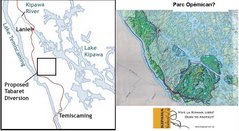
If Hydro Quebec is not actively pursuing Tabaret what is that bite out of Opemican for?
Kipawa Dam: After

Laniel Dam at 2006 Rally
Where is the Kipawa
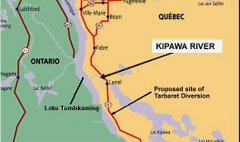
Kipawa flows into lake Temiskamingue, running from Kipawa Lake, under hwy 101 in Quebec
Kipawa Dam

laniel dam at 2004 River Rally
Tabaret is a Bad Idea
About the Kipawa
The best thing paddlers can do to help the cause of the Kipawa:
1. attend the rally and bring others including non paddlers to attend and buy beer and have fun
2. write your MP /MNA and raise the issue and post your objections -1 letter = 200 who didn't write
3. Write Thierry Vandal the CEO of Hydro Quebec strongly opposing the 132 MW standard decrying the use of "diversion" as the most environmentally inappropriate method of power production
4. Write Jean Charest, Premier of Quebec protesting that either the algonquin or the tabaret project will eliminate all other values on the Kipawa River by turning it into a dry gulch.
5. See if you can get other allied groups interested by showing your own interest, ie the Sierra Defense Fund, Earthwild, MEC, and so on.
6. Demand further consultation
7. Currently we are at the point where we need to sway public opinion and raise awareness.
However, if all else fails, don't get mad, simply disrupt, foment, and protest . The Monkey Wrench Gang.
Have you read Edward Abbey?
Important Addresses
CEO,Hydro Québec, 75 boul René Levesque, Montreal, P.Q., H2Z 1A4Caille.andre@hydro.qc.ca
The best thing paddlers can do to help the cause of the Kipawa:
1. attend the rally and bring others including non paddlers to attend and buy beer and have fun
2. write your MP /MNA and raise the issue and post your objections -1 letter = 200 who didn't write
3. Write Thierry Vandal the CEO of Hydro Quebec strongly opposing the 132 MW standard decrying the use of "diversion" as the most environmentally inappropriate method of power production
4. Write Jean Charest, Premier of Quebec protesting that either the algonquin or the tabaret project will eliminate all other values on the Kipawa River by turning it into a dry gulch.
5. See if you can get other allied groups interested by showing your own interest, ie the Sierra Defense Fund, Earthwild, MEC, and so on.
6. Demand further consultation
7. Currently we are at the point where we need to sway public opinion and raise awareness.
However, if all else fails, don't get mad, simply disrupt, foment, and protest . The Monkey Wrench Gang.
Have you read Edward Abbey?
Important Addresses
CEO,Hydro Québec, 75 boul René Levesque, Montreal, P.Q., H2Z 1A4Caille.andre@hydro.qc.ca
Tabaret is a Bad Idea (Part Two)
Les Amis de la Riviere Kipawa is poised to use an application to the Federal Court to issue a Writ of Mandamus to ensure the Minster does what he is supposed to do, protect the public's right to navigate the water control structure at Laniel, Quebec using the Navigable Waters Protection Act. (see http://www.kipawariver.ca/)
In the now gutted Navigable Waters Protection Act lay the means by which the Minister of Transport could keep the public right of passage down our great Canadian Heritage, our rivers and streams which are threatened especially by resource corporations and power brokers such as Hydro Quebec.
These powerful entities continue to petition that 'this' river or 'that' stream is not navigable and therefore not protectable.
I don't say that dams and bridges should not be built, only that if they are, historical navigation rights should be considered and preserved by making reasonable accommodations for recreational boaters.
It is the Minister of Transport, in exercising the right to allow or disallow work on or over a navigable waterway is what keeps boats and recreational boaters plying our waterways.
To many recent cases launched in the Federal Court concerning the Navigable Waters Protection Act, most recently the case of the Humber Environment Group of Cornerbrook Newfoundland versus the Cornerbrook Pulp and Paper Company indicates that the important oversight is not being faithfully performed. Have we really come to the point now where we must say "such and such a stream is one foot deep, possessing so many cubic feet per second flow and so on?" The answer to this is... YES!
The honourable Mr. Justice John A. O'Keefe, ruled that it had not been shown that the river was navigable. How convenient was that to the Minister? But either the Minister of Transport acts to protect our rivers and streams as a public right or he does not and that means rivers and streams currently enjoyed by kayakers and canoists.
Enough of the cheating, and double-talk. Canadians! our rivers and streams are our own, lets urge the Minister of Transport and the our government to protect them.
Peter Karwacki
In the now gutted Navigable Waters Protection Act lay the means by which the Minister of Transport could keep the public right of passage down our great Canadian Heritage, our rivers and streams which are threatened especially by resource corporations and power brokers such as Hydro Quebec.
These powerful entities continue to petition that 'this' river or 'that' stream is not navigable and therefore not protectable.
I don't say that dams and bridges should not be built, only that if they are, historical navigation rights should be considered and preserved by making reasonable accommodations for recreational boaters.
It is the Minister of Transport, in exercising the right to allow or disallow work on or over a navigable waterway is what keeps boats and recreational boaters plying our waterways.
To many recent cases launched in the Federal Court concerning the Navigable Waters Protection Act, most recently the case of the Humber Environment Group of Cornerbrook Newfoundland versus the Cornerbrook Pulp and Paper Company indicates that the important oversight is not being faithfully performed. Have we really come to the point now where we must say "such and such a stream is one foot deep, possessing so many cubic feet per second flow and so on?" The answer to this is... YES!
The honourable Mr. Justice John A. O'Keefe, ruled that it had not been shown that the river was navigable. How convenient was that to the Minister? But either the Minister of Transport acts to protect our rivers and streams as a public right or he does not and that means rivers and streams currently enjoyed by kayakers and canoists.
Enough of the cheating, and double-talk. Canadians! our rivers and streams are our own, lets urge the Minister of Transport and the our government to protect them.
Peter Karwacki
Tabaret is a Bad Idea (Part Three)
10 Reasons WhyTabaret is a Bad Idea1) Tabaret is too big. The station is designed to useevery drop of water available in the Kipawawatershed, but will run at only 44 percent capacity.We believe the Tabaret station is designed to usewater diverted from the Dumoine River into theKipawa watershed in the future.
2) The Tabaret project will eliminate the aquaticecosystem of the Kipawa River.The Tabaret project plan involves the diversion of a16-km section of the Kipawa River from its naturalstreambed into a new man-made outflow from LakeKipawa.
3) Tabaret will leave a large industrial footprint on thelandscape that will impact existing tourismoperations and eliminate future tourism potential.
4) The Tabaret project is an aggressive single-purposedevelopment, designed to maximize powergeneration at the expense of all other uses.
5) River-diversion, such as the Tabaret project, takinglarge amounts of water out of a river’s naturalstreambed and moving it to another place, is verydestructive to the natural environment.
6) The Kipawa River has been designated a protectedgreenspace in the region with severe limitations ondevelopment. This designation recognizes theecological, historical and natural heritage value ofthe river and the importance of protecting it.Tabaret will eliminate that value.
7) If necessary, there are other, smarter and morereasonable options for producing hydro power onthe Kipawa watershed. It is possible to build a lowimpactgenerating station on the Kipawa river, andmanage it as a “run-of-the-river” station, makinguse of natural flows while maintaining other values,with minimal impact on the environment.
8) The Kipawa watershed is a rich natural resource forthe Temiscaming Region, resonably close to largeurban areas, with huge untapped potential fortourism and recreation development in the future.Tabaret will severely reduce this potential.
9) Tabaret provides zero long-term economic benefitfor the region through employment. The plan is forthe station to be completely automated andremotely operated.
10) The Kipawa River is 12,000 years old. The riverwas here thousands of years before any peoplecame to the region. The Tabaret project will change all that.
Problems on a local River?
- There is more to do as well but you have to do your research and above all, don't give up.
- IN the meantime prepared a document itemizing the history of navigation of this spot and its recreational value. Use the Kipawa river history of navigation as a guide: see www.kipawariver.ca
- Under the Ministry of Environment guidelines you have a set period of time to petition the change under the environmental bill of rights, you may have limited time to take this action. But it involves going to court for a judicial review of the decision.
- 4. contact the ministry of natural resources officials and do the same thing.
- 3. contact the ministry of the environment and determine if they approved the project
- 2. determine if the dam was a legal dam, approved under the navigable waters protection act.
- 1. research the decision and timing of it to determine if an environmental assessment was done.
Minden Ontario
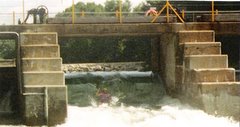
Gull River Water control at Horseshoe lake
A History of Navigation on the Kipawa River
Prior to the environmental assessment there was no signage at the Laniel Dam
T-Shirts Area: These are available now!

Send $25 and a stamped self addressed envelop for the Tshirt, and for the bumper sticker, a stamped and self addressed envelope with $5.00 for the bumper sticker to Les Amis de la rivière Kipawa, 80 Ontario St., Ottawa, Ontario, K1K 1K9 or click the link To purchase a Les Amis "T" contact Doug with the following information: Number of shirts:Sizes: Ship to Address: Method of Payment: cash, cheque and paypal, Shipto address:
Bumper Stickers Now Available

Get your bumper sticker and show your support for the Kipawa Legal Fund ! - send $5.00 in a Stamped, self addressed envelope to: Peter Karwacki Box 39111, Ottawa, Ontario, Canada, K1H 7X0

